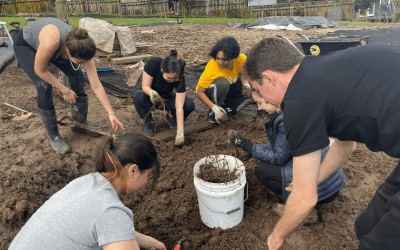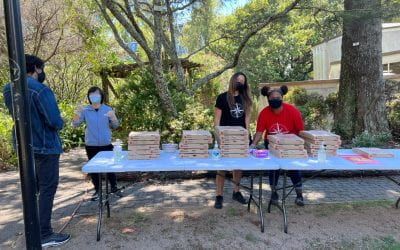Peace Week
Peace Week was established as a means of remembering the victims of the Christchurch mosque shootings in March 2019.
The theme for this year was Empathy, and we observed the week online whilst in lockdown with an insightful webinar hosted by the Maclaurin Chapel and hearing from some of our students about what empathy means to them. The University of Auckland Muslim Students’ Association ran a toy collection for Starship Children’s Hospital throughout the week.
The University and Maclaurin Chapel invited Hamimah Tuyan, the partner of Zekeriya Tuyan, one of the Shuhada (martyrs) in the Christchurch mosque attacks, to speak about how empathy can change an individual and has the power to shape society for the better. Reflections by Michael Steedman, Pro Vice-Chancellor (Māori) at the University of Auckland, Muhammed Shaakir Ismail, Imam at the Avondale Islamic Centre, Timothy Pratt, Lead Chaplain at Maclaurin Chapel and students from the University of Auckland Muslim Students’ Association (MSA) provided insightful perspectives and worldviews.
Read on to see what empathy means to Ermina, Daniel, Tamika, Amritha and Manisha.
Ermina Tajik
To me, empathy means putting yourself in someone else’s shoes and viewing the world from their perspective. How are they feeling? What challenges are they facing? What keeps them going? The insights you gain from trying to understand the world from different perspectives help you think about the different effects both your and others’ decisions will have on people. Empathy is the first step to compassion, which is usually followed by kindness, and all of this is necessary to help bring peace in a world that can often be filled with animosity.
A true Muslim is someone who practices kindness and empathy with sincerity. I’ve been brought up with this belief all my life, and so have always tried to keep an open mind and think of others. In my day-to-day life, empathy gives me another layer of awareness of the people around me from strangers on the street to my classmates. It motivates me to be there for people and understand them more. It’s also been a strong encouragement for me to give back to people and be involved in a variety of activities to do so.
I’m currently the secretary of the University of Auckland Muslim Students’ Association, a role I am very passionate about as it allows me to help ensure that the needs and rights of Muslim students are both heard and catered to. I’ve also been an academic tutor for over 10 years, ever since I fell in love with it the first time I saw a student overjoyed with their abilities, and those are my ways of giving back to the community.
Daniel Wells
When I think of empathy, I believe that I and a lot of others immediately think of its use in situations where we try and support those around us who might be dealing with tough situations or feelings. However, having recently been asked to reflect on what empathy means to me, human connection also comes to mind.
As a person who has been diagnosed with Aspergers, growing up I dealt with being treated as “different” and I experienced the bullying that came with being different. In addition to the hurt this caused me growing up, it also made it difficult for me to make meaningful connections with others.
Despite this, I like to think that I enact empathy in most things I do. Having felt those negative emotions throughout my childhood, and into adulthood, I’ve developed an acute awareness of how others might perceive experiences negatively. So now I do my best to either prevent those negative experiences or support those that have been affected by negative experiences. I do this in the hope that I can dampen the impact it has on others or for how long it impacts people.
As I said, empathy is more than just supporting others who are going through tough times, it’s also about the connection and the corresponding positivity and wellbeing that it can bring. Having felt like I lacked that earlier in life, I now try to make sure that those I interact with feel valued for their opinions and for who they are as a person so that they don’t have to feel how I did. And this is why I’m so grateful to be a wellbeing ambassador at the University, because I get to use the empathy I have for my peers, and especially those on the fringes of our community, to give voice to their needs, to inform meaningful changes in the way we do things at uni, and to hopefully contribute to an increase in the level of equity and wellbeing in our community.
But I am just one person, and just because this is what empathy means to me doesn’t make it correct. So I encourage anyone reading this to reflect on what empathy looks like for you and how you as an individual (and we as a community) can be more empathetic to those at uni and the wider community alike.
Tamika Prins
Paul the Apostle tells us that empathy is compassion for one another. As a Christian, this is what I strive to exemplify. Empathy is exercised in various ways, affectively, cognitively and emotionally. For me, empathy in my day-to-day lifestyle looks like taking the time to listen, but also share with those in my life. By doing this, I gain a better understanding of others.
For me giving back to my community means being an active contributor to society and various organisations. Such as fundraising for I am Hope, so young people can receive the necessary support they need. As well as hosting fundraising breakfast for Breast Cancer New Zealand and cooking for whānau staying at their Ronald McDonald house. Giving back, to me, means being present and engaged with everyone who crosses my path.
When I think of empathy, I believe that I and a lot of others immediately think of its use in situations where we try and support those around us who might be dealing with tough situations or feelings. However, having recently been asked to reflect on what empathy means to me, human connection also comes to mind.
Amritha Sreenivasan
Empathy encompasses many things. It can range from simple consideration to respect. When you break it down, empathy begins with putting yourself in another person’s place in a certain situation, essentially taking another person’s perspective. You begin to understand what they are experiencing at the time. This is when you take the initiative, that extra step to make them feel understood, and attempt to lift whatever negative load they may be carrying.
It naturally finds a way to be a part of my day, whether I realise it or not. Every time a friend misses out on their daily Starbucks, a team member struggles to complete a project or even a stranger on the street who realised they left their bus card at work. You can’t help but relate to those around you in these situations. A small act can go a long way – although overused, I stand by it. The slightest help, even if it’s just making someone laugh through a tough time, can really make a difference.
I try to give back to my community by taking up opportunities such as volunteering for organisations, participating in volunteering events, as well as being active in certain roles at university. I did many volunteering activities in high school including sewing blankets and arranging donation boxes for Littlemore. Collectively, volunteering helps me grow as an individual and explore what empathy means to me, as well as how I wanted to express it going forward. By being part of each of these opportunities, I continue to feel the same sense of satisfaction knowing the hard work I have done could help someone else.
Manisha Juneja
In the first stages of our life, we come to learn human emotions from our caregivers and the people we meet. To me, empathy means forming a connection with others in a way in which we can help them know that they were not alone. Having empathy gives me an opportunity to lighten one’s heavyweight of emotions.
No matter which path we choose to walk in our life, there will always be different ways we can be more empathetic and compassionate. Working at the hospital and attending university, I meet a diverse range of people from a range of cultures. We are all creatures bristling with judgment, but in the end, it comes down to whether we are willing to reach out and ask the question “what matters to you”? Asking this simple question can bring about a picture we could not depict with just first impressions.
One of my favourite ways of giving back to the community is being able to volunteer in a group. This enables me to meet people from various backgrounds and gain a wider perspective. Some examples of this include helping with orientation through the UniGuide programme, joining Volunteer Day to plant trees or joining in the various clubs we have at university that aim to help others.
There are so many ways we can continue to do good, whether it’s picking up rubbish on the floor, helping out a friend, providing monetary assistance, or helping someone with directions. It all may sound insignificant, but these small acts of compassion become a habit we should all celebrate.
Halls Balls 2022
Our Accommodation kainoho | residents got to celebrate their year at the annual Halls Balls. Check out their looks from the night!
Volunteer Day 2022
On Saturday 24 September, the UoA Volunteers Club put in the mahi and made our second annual Volunteers Day a huge success.
2022 UniGuide Hangouts
Hosted by UniGuides, this series of hangouts gave new and current students a chance to meet, relax and get to know each other.








